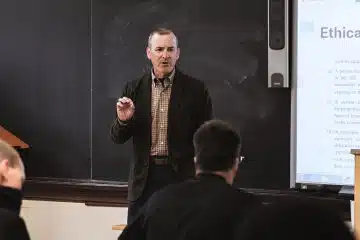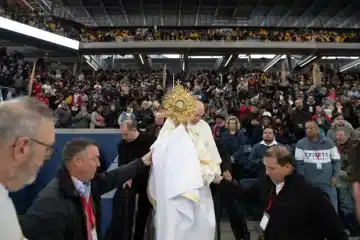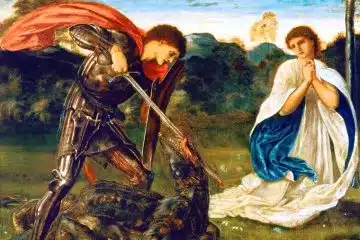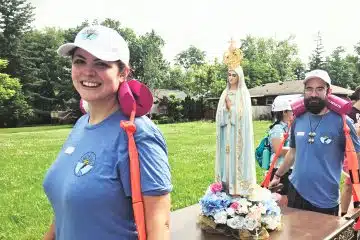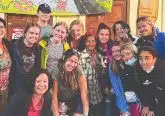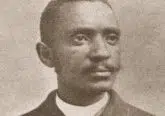Program grows interest in feeding the hungry
Friday, July 23, 2010
By Mary Caffrey Knapke
SPRINGFIELD DEANERY — “The idea came about because of a hurricane.”
That’s how Alex Loehrer explains the inception of the Little Flower’s Big Harvest program at St. Teresa of the Child Jesus Parish in Springfield.
In September 2008 the remnants of Hurricane Ike wreaked havoc on areas throughout the archdiocese. In Loehrer’s backyard, the winds blew a neighbor’s maple tree into power lines, where it caught fire and smoldered throughout the storm. Later, the maple and Loehrer’s own 50-foot pine tree were taken down, and a patch of yard was suddenly cast in full sun. He thought it would be fun to put in a garden and let his children learn about growing plants, so “we planted the garden and it did better than I ever thought it would — to the extent that we were giving away food to neighbors left and right.”
 |
| Alex Loehrer will donate some of his garden produce to the Second Harvest Food Bank in Springfield. (CT/Mary Caffrey Knapke) |
The experience inspired Loehrer to share some of his abundant produce with someone in need and encourage others to do the same. Now the Little Flower’s Big Harvest is comprised of volunteers who have pledged to do just that. Every Sunday, Loehrer opens a garage at the parish and sets up an electronic produce scale. All donated produce is delivered to Second Harvest Food Bank of Clark, Champaign and Logan counties at Catholic Charities SouthWestern Ohio, part of the Feeding America network.
“Sometimes it feels as though our mission will never be completed. That being said, it is truly amazing what a difference this food bank makes in so many people’s lives,” said Jeff Miller, director of food bank operations at Second Harvest. The food bank currently serves 107 agencies, such as soup kitchens and pantries, which in turn provide more than 250,000 meals a month. The organization is also hoping to begin using an adjacent field as a community garden.
“The need for food is great,” Miller said. “Many people who were donors are now our clients. At our pantries, we are seeing upwards of a 30 percent increase in families served.” Miller, also a parishioner at St. Teresa, said he takes inspiration from the words of Mother Teresa: “If you can’t feed a hundred people, then feed just one.”
The food bank has received donations of garden produce in the past, but Miller said this is the first organized group effort that he is aware of. “The families who receive them are thrilled,” he said. Canned or frozen vegetables are always appreciated, but “I have seen eyes twinkle when they are handed fresh peas in a pod. It is a treat and very healthy.”
Loehrer said he takes inspiration from the Gospels and from the parish’s patroness, Saint Thérèse of Lisieux, also known as “The Little Flower of Jesus,” who is known for her “little way” or, as she wrote, “the doing of the least actions for love.”
He was also inspired by Father Ed Gearhart, pastor of St. Teresa, who has called for parishioners to make the parish “a center of life in order to better live the Gospel.”
“I give so much credit to Father Gearhart for taking these ideas and really nourishing them and allowing parishioners to do this. This is just one of many things that are going on in a parish that’s really recapturing and encouraging vitality,” Loehrer said.
Father Gearhart said he is “extremely proud” of the ways parishioners are involved in the greater Springfield community. “The Little Flower’s Big Harvest Program is another effort to get people involved in doing something I see as a need in the community and an outlet for something a number are already doing through Catholic Charities. Parishioners are going to have those [garden] surpluses that can play a big role in feeding those most in need.”
Early season produce donations included lettuce, radishes and snap peas. Now gardeners throughout Springfield and beyond are nurturing extra plants to donate beans, squash, tomatoes and a variety of other vegetables.
“If everybody decided to grow an extra plant or had a garden already and dedicated a section to it, or bought a tomato plant or a potted plant, it would be food that wouldn’t have existed otherwise, and it could be put toward good in our community,” Loehrer said. “It’s a little bit of time and a little bit of space, with a big impact that you can make because of it.”
For more information about the program, visit littleflowersbigharvest.wordpress.com.
Mary Caffrey Knapke can be reached at [email protected].


